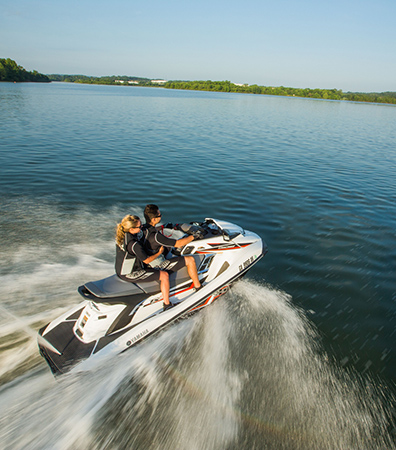
Watercraft Safety Tips
Right of Way
Follow basic boating guidelines. Sailboats, commercial vessels, and fishing vessels always have the right of way. Stay to the right of when approaching an oncoming craft, so that it passes on your left side. When overtaking another boat, pass on the right or left, but stay clear. If you are about to cross paths with another boat, the craft on the right side has the right of way. Slow down to let the boat on your right continue its course, then pass behind it.
Awareness
Constantly look for traffic on the water around and especially near you. Know where other boats are and where they're heading before you make a turn or cross a wake.
Wave or Wake Jumping
If your course takes you across the wake of another boat, make sure your visibility is not obstructed by that boat. Stay far enough behind it so that you can see if other traffic is coming your way.
Operating Speed
Follow local regulations regarding speed limits, whether posted or not. In congested areas, lower your speed.
Passengers and Guests
Never carry more than the maximum passenger load specified for your craft. If you loan your craft to a friend, make sure he is of legal operating age and that he knows how to operate your craft. Make sure he is fully aware of these safe boating rules.
Maintenance
Check your craft internally and externally before you get on the water. Make sure the throttle and all switches are working properly, that fuel and battery lines are properly connected, that no fuel is leaking, and that cables and steering are functioning.

Other Considerations
Launch Ramp Etiquette
Be considerate and efficient when launching your personal watercraft. Prepare your craft beforehand, and perform all safety checks before you get into the water. Launch quickly and quietly.
Noise
Be considerate of waterfront property owners and others near and on the water. Excessive noise from a poorly maintained or modified exhuast system disturbs others and is illegal in many areas.
Environments
Repect ecologically-sensitive areas. Don't spill fuel or oil and don't leave litter or other pollutants where they don't belong. Be sensitive to marine life; the water is their home.
Other Water Enthusiasts
Personal watercraft riders must share the waterways with other boaters, fisherman, swimmers, surfers, and skiers, so respect their rights to safety, access and use of the water.
Remember to Ride Responsibly!
It's up to you to use your good judgement and to obey all local ordinances that apply to you and your watercraft.If you have any further questions regarding PWC and their safe use, try contacting these organizations for more information:
- Personal Watercraft Industry Association
- U.S. Coast Guard Auxilary
- Personal Watercraft Riders Association
- International Jet Sports Association
- Boating and Personal Watercraft Clubs
- American Red Cross
- State Boating Authorities
- U.S. Power Squadron
- Local Sheriff's Office
